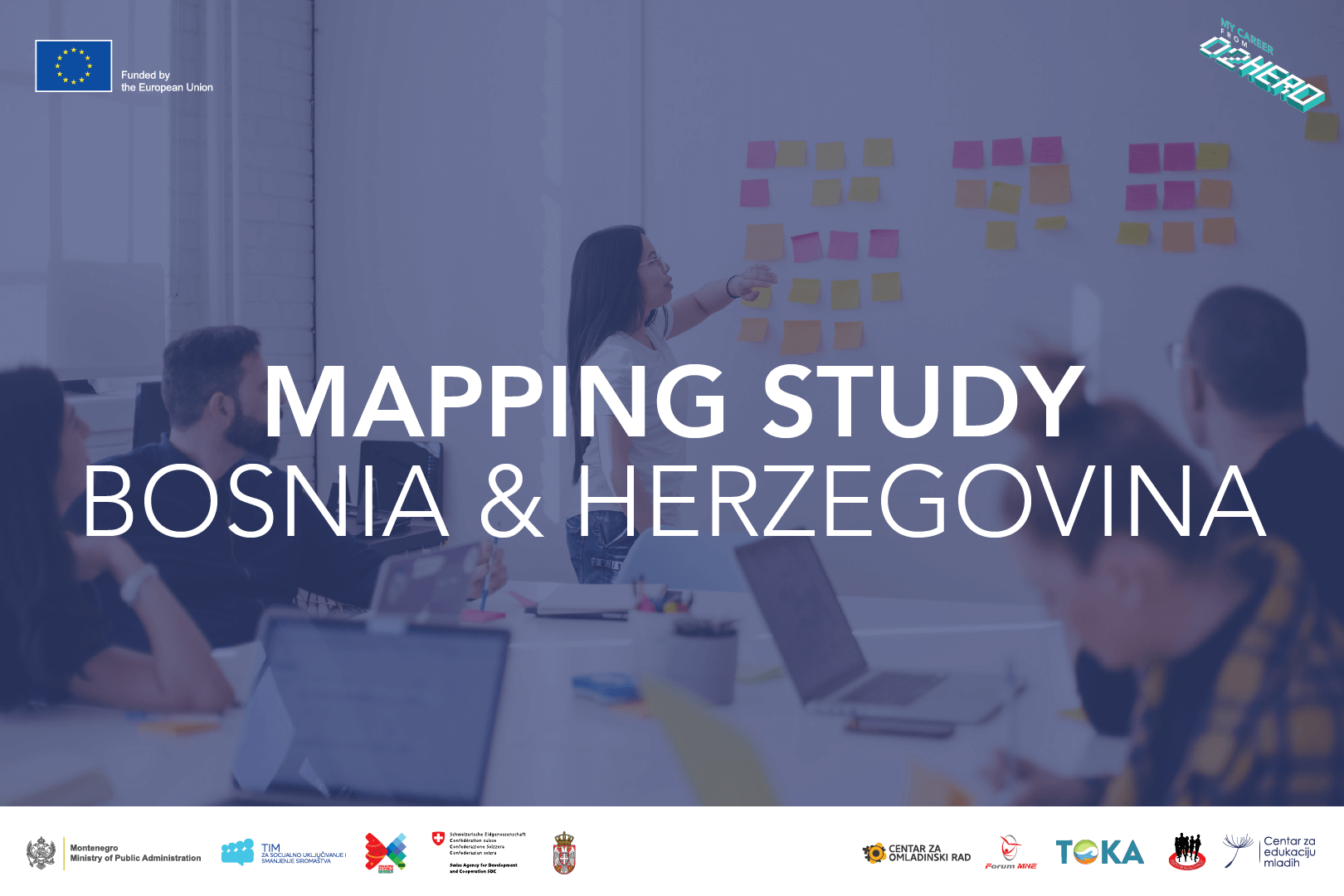In BiH, according to the ILO, unemployment is at a very high level especially among youth where it reached 34% in 2019. ILO estimates that each forth young person is unemployed. Lack of skills and lack of practical experience are often cited by the CSOs, market, and the authorities as the crucial factor for youth unemployment. This is particularly evident in the IT field, where the market is continually changing and demands continued work and self-learning. The educational institutions are not agile to adapt to rapid changes in the market where non-formal education can fill the gap and is an effective tool for improving skills. This also relates to the growth of the skills required to succeed in the 4.0 Industrial Revolution which combine all: soft skills, transferable skills and entrepreneurial skills.
This mapping study was conducted to serve as a base for scaling and improvement of the developed and tested one-stop shop model of education within the project “My Career from Zero to Hero”. The aim of the study was to identify the current state of affairs in Bosnia in Herzegovina, related to the employability of youth in the 4.0 Industrial Revolution jobs. The quantitative research instrument – survey was used for the target groups NEET, CSO and IT & SME companies, while interviews were conducted with the representatives of governmental employment institutions. The Researcher and the Partner reached to over 100 NEET youth, either through direct contact, or via e-mail and social networks platform. Over 50 CSO and IT companies have had the opportunity to participate in the study out of which 30 provided their input. The study explored the following:
- Competences and needs of NEET youth
- Market needs in comparison with the competence framework
- Existing youth employment and employability models and programs
- CSOs capacities for conducting youth employability programs
- Sustainability options for the one-stop-shop youth employment model
The main findings of the study are the following:
NEET are difficult to reach: Although NEET covers a significant portion of the population in Bosnia and Herzegovina, they are often difficult to reach because of their passive daily habits. CSOs, businesses and Government Stakeholders can certainly improve their perspective, as well as improve the perspective of active youth. They should be addressed by cross-sectoral collaboration between the public, civil and business sectors.
Education levels: The Majority NEET have a university degree (or more), but almost all of them have not been consulted by an educational institution on any job opportunities. Awareness-raising of the needs of the market is a crucial step in the fight against unemployment.
Employment models: Almost ½ of the participants list full time work as preferred mode of employment, where around ¼ of the participants list freelancing and paid internships as preferred type. CSOs should continue to work with NEET to help them find funding for start-up companies and to provide guidance and mentoring for the growth of entrepreneurial skills.
Lack of awareness about the programs of education: There is a high awareness of NEET on importance of non–formal education, but low engagement. The majority NEET did not participate in non–formal education program for the following main reasons: did not learn of them, did not know how to find them, and/or lack of financial resources.
Technical skills: The focus of the market is on technical skills, which the majority NEET do not have.
Soft skills: The majority NEET reported that they have almost all soft skills formed at a very high level. On the other hand, the IT companies claim to have troubles finding young people with these skills.
Hiring factors: Recommendations are the most efficient tool for employment, job advertisements and social networks. Most employers find previous working experience, references and university diploma to some extent relevant, but not as a crucial factor for hiring. Soft skills and non – formal education have a very significant influence on employer’s decision to hire.
Formal education: Many businesses find that the emphasis is on skills. Formal education is relevant but not an elimination factor in cases where candidates are not formally educated in IT. Applicants should have skills, and whether they come from formal or non-formal education is not relevant.
Employment agency programs: State employment agencies implement programs to foster youth find the first working experience, but their programs are not specifically developed for NEET or sensitive to particular industry sector such as IT. State employment agencies implement policies to encourage youth employment of a general character. They are not focused on a specific sector, such as IT, and do not focus on skills.
Legal framework for internships: There is a lack of a legislative structure for coordinating internships and professional trainings. Employers are also worried that the employment inspectorate and tax authorities may qualify internships or professional trainings as work without an employment agreement, which is against the law.
CSO programs: CSOs are experienced in tackling youth unemployment, but do not rely on state employment agencies to provide them with necessary data, or to help them in organizing these programs. They confirm that the weak legal framework is an issue in organizing youth programs. CSOs confirm the market and NEET view on the importance of computer and social skills, however do not find the specific IT skills (knowledge of programming languages and other software) to thrive in the employment market, but could improve youth market competitiveness.
CSO networking: The lack of interest on the side of more than half of contacted CSOs demonstrates lack of will to cooperate between CSOs. Most CSOs could help youth enhance their social skills and general computer skills, excluding specific IT related skills which are relevant for the market. This means that their employment programs require cooperation with other CSOs.

